'Bring back my abducted daughter from war-torn Yemen'
"Depression has plagued me and now as I listen to my daughter's screams as the bombs drop around her, the nightmare continues."
In May 1986, Jackie Saleh's three young daughters were abducted by her husband and taken to Yemen. Now, as war rages there, she is desperate to bring her youngest back to the UK.
My favourite memory of my three girls is them playing together in our cosy terraced house.
They were so mischievous, stealing sweets from the fridge and going upstairs to my bed to share them out.
Aged five, Rahannah was the smart, stubborn one who knew what she wanted.
A year younger, Nadia was so sweet and loving, desperate to be with me.
Safia, meanwhile, was aged just 18 months, toddling around and babbling away, stealing my heart more and more each day.
I recall her sat in the garden eating a bar of soap and saying, 'Look mummy, it's chocolate'.
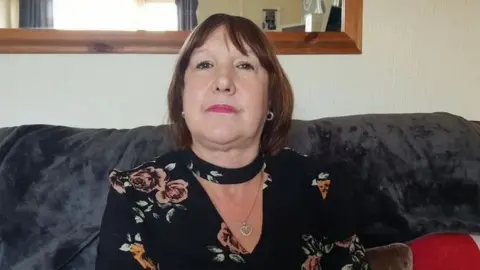
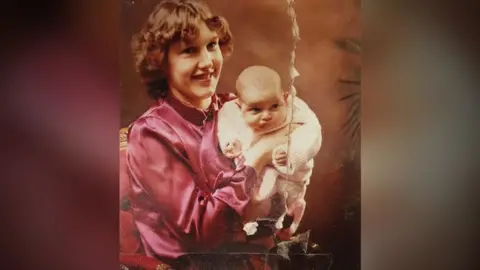 Jackie Saleh
Jackie SalehThese three beautiful girls were born into what was, at first, a happy and stable relationship.
I had met their father, Sadek Saleh, back in the late 70s at a disco.
This was a time of Michael Jackson on the airwaves, of flared jeans and big collars.
He was from Taiz, in Yemen, but lived in Cardiff with his father.
We fell in love, had the children, then got married.
Then things went wrong - he was drinking, gambling and not working.
He became very controlling of the children, to the point they were scared of him.
After six years of marriage, I had had enough and wanted a divorce.
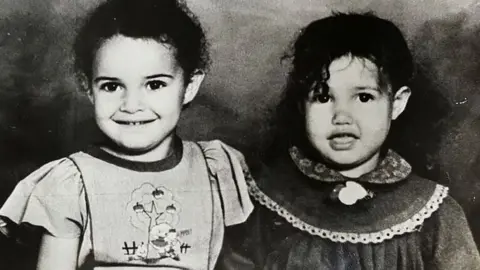 Jackie Saleh
Jackie SalehIt was a weekend in May 1986 that my world ended.
I was bedbound with flu so he told me he would take the children to his father's house in nearby Roath for a night.
But when they didn't return as planned on the Sunday morning, I was frantic.
Police arrived, pulling up floorboards, asking questions.
They then tracked Sadek, telling me he had travelled to London with the children, then boarded a plane to Saudi Arabia.
When I heard he had left the country with them, I died inside.
My babies were gone, and when I trawled the house, although some of their clothes and toys remained, most of my photos of them had vanished too.
He had not only taken my children, he had tried to erase all memory of them from my life.
What followed was a living nightmare.
Interpol searches traced Sadek around the Middle East and eventually to Yemen, where all leads were lost.
Back at home 4,000 miles away, my life was over.
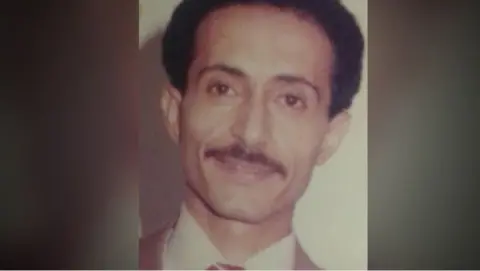 Jackie Saleh
Jackie SalehI had gone from being a mum of three, to having nothing but a huge void.
I spent my time at meetings, either with the Home Office or other families who had gone through abduction.
Wales' former first minister Rhodri Morgan spent a lot of time with me, trying to help.
My children were British citizens, they had British passports. Surely someone could do something?
But the slow passing of years ticked by, first one, then two, along with birthdays and countless Christmases.
I had missed so much - new school years, sports days - then one day I woke up to realise my gorgeous daughters would be young women.
Despite this, somehow I never lost hope that I would see them again.
And one day, in early 2001, a letter landed on my doormat written in Arabic.
My heart leapt, and sure enough, when I got it translated, it was from my eldest Rahannah.
Not only had my smart daughter remembered me, she had also remembered her home address, and after fleeing from her dad, had written to me. We established communication and I flew to Yemen in the May.
But, by now, the situation was completely different.
Rahannah was 21 and Nadia was 19 and it was incredibly intimidating stepping off the plane to greet them with hugs and tears.
I had prepared myself for what my children might be like.
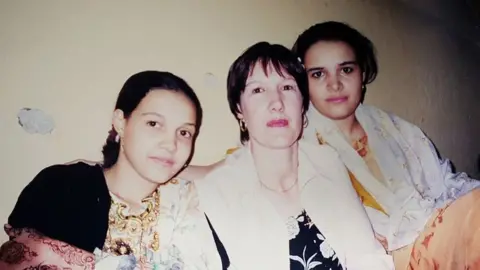 Jackie Saleh
Jackie SalehThey were Muslim, completely veiled in the full niqab, yet they were my daughters and when they showed their faces, I saw they still looked like me.
Through their minimal English I learnt that life had not been good to them.
Yemen was desperately poor and both had been child brides, married off to men much older than them.
Still, some things hadn't changed.
Rahannah was still the headstrong leader, telling me she had never forgotten me or given up looking for me.
Nadia was still so loving, but it was clear she had been traumatised from being abducted and married off so young.
She was like a little girl and it was heartbreaking to see.
It turned out Safia - my baby - had been told a different woman was her mother and had no idea of the truth.
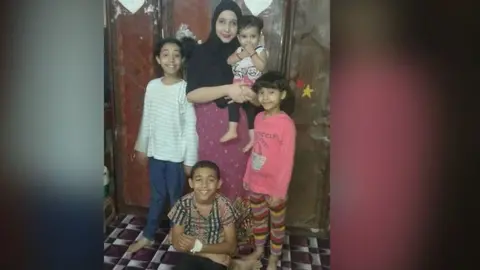 Jackie Saleh
Jackie SalehSo one day, I was driven to her school where I met her, telling her I was her mother and presenting her with her British birth certificate.
It was so overwhelming and emotional that she ended up lying on the floor weeping.
Then, as real life dictated, I returned home to the UK as their lives continued in Yemen.
Rahannah had two children, but in 2007, Nadia died in childbirth, giving birth to her fourth baby. The local hospital didn't have the blood that she needed to be saved.
I can't tell you how her death makes me feel.
The same year, their father and abductor, Sadek, died too, though of course, by then the damage had already been done.
Fast forward to today, and my two remaining abducted daughters are still in Yemen.
At present, communication with Rahannah is patchy.

But I and my fourth daughter Lucy, 30, who I had later in life, are in regular contact with Safia, now 34.
She and her four children live near the town of Hodeidah, which is being bombed by Saudi Arabian warplanes as they battle the Houthi rebels that took over much of the country.
The war has now raged for more than three years, and has seen 10,000 killed with millions pushed to the brink of starvation.
The toll the fighting has taken is enormous.
Safia's health is not good.
She has recently had typhoid, and I know her youngest baby is very ill.
I speak to her as often as I can via video link, but sometimes when we are talking, she will scream at the children to get down as she can hear the bombs dropping.
Each time I call her, she cries and cries to be with me.
She is a British citizen, taken illegally from her birth country, robbed of her mother.
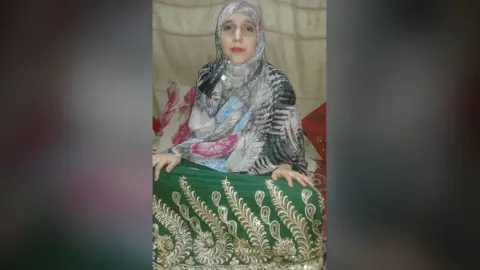 Jackie Saleh
Jackie SalehAfter all she has been through, doesn't she deserve a safe life with clean water and food, a hygienic toilet for her children?
That is why I am calling upon the British government to help.
British nationals need to be evacuated, but in light of the unlikeness of this happening, Welsh assembly member Neil McEvoy, has helped set up a crowdfunding page to raise money for Safia and her children to buy their own flights out.
As for me, if I think too much about the situation, I can't cope.
Depression has plagued me throughout the years, and now, as I listen to my daughter's screams as the bombs drop around her, the nightmare still continues.
I just need her home, back in Cardiff with me, like she always should have been.
A spokeswoman for the Foreign and Commonwealth Office (FCO) said: "We appreciate that the current situation is deeply distressing for Ms Morgan (Saleh).
"However, as the FCO travel advice makes clear, from February 2015 the operations of the British Embassy in Sana'a, Yemen, were temporarily suspended and diplomatic staff withdrawn.
"We continue to advise against all travel to Yemen and are unable to provide any form of assisted departure to British or dual nationals in Yemen."
